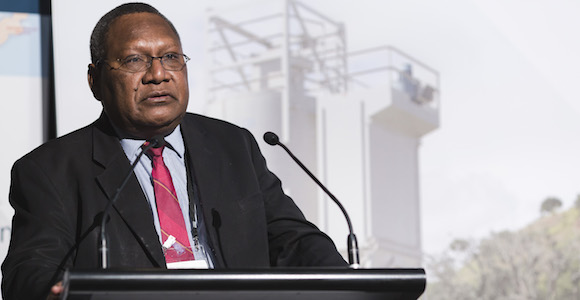The Bank of Papua New Guinea is looking to sell government debt to international and local investors. Its Governor, Loi Bakani, outlines the challenges to Business Advantage PNG and their connection to PNG’s ongoing foreign exchange shortages.
Presenting the 2020 National Budget, Treasurer Ian Ling-Stuckey indicated that the government would continue to rely on selling government securities (Treasury bills, central bank bills and inscribed stock) as a way of part-financing the record budget deficit.
So, who will buy government debt?
When it comes to purchasing government debt, Bank of PNG Governor Loi Bakani says the local commercial banks, super funds and insurance companies have ‘pretty much stabilised their holdings, their exposure to government.’
Bakani tells Business Advantage PNG that the central bank and the government are looking elsewhere for potential buyers – to big corporates that ‘have some of those surplus funds sitting around’, which may include profits that have yet to be repatriated.
‘A lot of these people are saying: “We have money, but we’re not sure where to spend it.” Our advice to Treasury and to these companies is: “Look, you have [already have] an investment in PNG: put in your money and then, when you want to use it, you can always mature it”.’
‘The bank is looking to put government securities on an online trading platform so ‘everyone, including overseas investors, can have access to them in order to buy and sell on PNG’s securities exchange.’
Bakani says the bank has, through its investment managers, been pitching PNG’s public debt securities to international buyers, especially in Australia and Singapore, without major success.
There are, however, opportunities closer to home.
‘The other segment that we’re looking at is the mum-and-dad investors and small SMEs [small and medium enterprises]; they’ve been showing interest. We’ve been going around the provinces. The minimum purchase is about K5000 and they’re quite willing to put in their money.’
PNG’s one-year Treasury bills are currently yielding 7.02 per cent, high by international standards and ahead of the government’s projected 2020 inflation rate of 5.7 percent.
Trading platform
One of the challenges facing the central bank is to develop more overseas demand for securities that are denominated in the local currency, the kina. This lack of demand for kina-denominated assets is the reason for PNG’s long standing foreign exchange shortages.
Bakani says the bank is looking to put government securities on an online trading platform so ‘everyone, including overseas investors, can have access to them in order to buy and sell on PNG’s securities exchange [PNGX].’
He acknowledges there is a wariness amongst international investors. PNG’s strict anti-money laundering legislation may be a disincentive for some, he observes. Another may be a concern that the government will be unable to pay when the debt securities mature (they cannot be bought or sold before maturity because there is no readily accessible secondary bond market).
‘Because of the nature of the economy, which is highly import-dependent, importers will start to pass on that price to the consumers.’
But the central bank will always be able to provide ‘support’, he says. The ExxonMobil-led PNG LNG project has, since late 2017, begun paying some taxes. ‘That’s been building up, the flow has been slowly increasing – taxes and dividends paid by companies such as Kumul Petroleum Holdings and Oil Search. They pay directly to us and we give the credit to the government account.’
He says the capital from PNG’s first sovereign bond raising of $US500 million (K1.7 billion) will also be put ‘straight into the market over time.’
If the Papua LNG and P’nyang projects go ahead, some ‘big flows’ of capital will come into the country and ‘change the tide’. At that point, the central bank may change tack in the currency markets.
‘I might go to the other side and start buying foreign currency,’ suggests Bakani.
Interbank market
Bakani rejects claims, including from the International Monetary Fund (IMF), that the central bank is ‘stopping the movement of the kina’ to a true, lower value (PNG has a floating currency).
Economists argue that a cheaper currency boosts exports. Bakani, however, says that depreciating the kina would be unlikely to lead to higher exports because of PNG’s ‘small export base’.
He does think it would lead to higher prices. ‘Because of the nature of the economy, which is highly import-dependent, importers will start to pass on that price to the consumers.’
The main issue with the kina, says Bakani, is a lack of activity in the interbank market: ‘where banks can sell their surplus foreign currency and those who need it can buy it.’ (This is another symptom of the lack of demand for kina-denominated assets).
The exchanges in the interbank market ‘set the excess rate’ for the day, Bakani explains. ‘At the moment, there’s no interbank market, so the price [for the kina] cannot be set.’
Until overseas demand for kina-denominated assets can be increased, the foreign exchange situation in PNG is likely to remain challenging.










Speak Your Mind